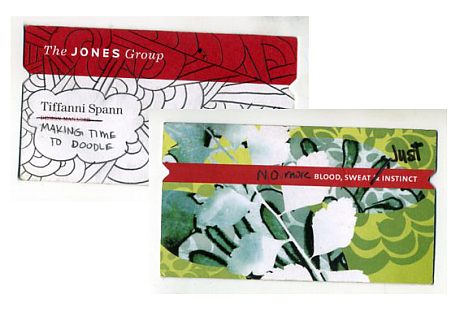Kid Business Cards and the Permission to Dream
The most popular post on this blog over the last couple of months was a take on a job application cover letter written by a 6 year-old boy. I liked the post, (or I would not have published it), but I was really shocked how popular it was. So in the grand tradition of pandering, grasping, and shamelessly playing the 'kid' card again, once I came across this piece, about a Brazilian Ad Agency's project to design and print business cards for the 'dream jobs' of a bunch of schoolkids, I figured, why not share?
Here is the backstory - Red Balloon, an English School for kids in Brazil, asked the students at the school what they wanted to be when they grow up. Certainly a question we have been asking kids since well, there was potentially a different answer than 'chase saber-toothed tigers and try to kill them with stones in order to survive'.
Based on the children's answers, the ad agency Ogilvy Brazil designed personalised Kids Business Cards, a few examples you van see in the images below. The answers, combined with a bit of information and insight about the kids, created a really amazing set of artifacts and a kind of tangible, phyiscal representation of the kids dreams. These cards say - 'your dream is not just in your mind, it can be real, here is a bit of what it might look like'.

Below is a close up view of one of the cards - for a girl whose dream is to be 'the most pretty ballerina in the world.'

After the project was completed reps from the ad agency gave this assessment of the outcomes -
Result: more kids believe in their dreams and more parents believe in the importance of English for their kids' future."
I posted about this project mainly because I really loved the creativity and artistic qualities of some of the kids business cards - quite honestly they just look cool.
But I do think there is a larger point to this, we do ask our kids, nieces, nephews, cousins, students, etc. all the time 'What do you want to be when you grow up?' And we know that 99% of kids won't actually pursue the 'dream job' they identified at 9 years old. While that is certainly normal and expected, I also think that we as parents/teachers/adults sometimes jump too quickly to downplay, discourage, or even fail to even consider these childhood dreams. We are old. We know better. We know that we did not become astronauts, runway models, or relief pitchers for the Mets, (that last one was mine), so it is only responsible and realistic to assume that the random 4th grader won't become any of those things either.
But in our haste to be 'adults' I think we can forget what it was like to see the world as kids do, a world where still, mostly, anything was possible. Becoming a pop star, soccer hero, or a great inventor with a mansion - these are not at all unreasonable or unreachable dreams. Having these dreams is still 'allowed'. I thought about that when I read about these 'kid business cards'. A quick scan through them shows rock stars, sports legends, captains of industry.
All things that for our kids are fantastic and possible.
Even if we did not become those things ourselves.

 Steve
Steve




